- Clone
- OKT4 (See other available formats)
- Regulatory Status
- RUO
- Workshop
- HCDM listed
- Other Names
- T4
- Isotype
- Mouse IgG2b, κ
- Ave. Rating
- Submit a Review
- Product Citations
- publications
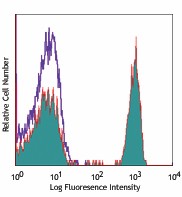
-

Human peripheral blood lymphocytes stained with OKT4 Alexa Fluor® 647. -

Human frozen tonsil tissue slices were fixed with 4% PFA for ten minutes and blocked with 5% FBS for 30 minutes. Then, the tissue was stained with 5 µg/ml of Brilliant Violet 421™ anti-human CD19 (clone HIB19) antibody (blue) and Alexa Fluor® 647 anti-human CD4 (clone OKT4) antibody (red) overnight at 4°C. The image was scanned with a 10X objective and stitched with MetaMorph® software.
| Cat # | Size | Price | Quantity Check Availability | Save | ||
|---|---|---|---|---|---|---|
| 317422 | 100 tests | £163 | ||||
CD4, also known as T4, is a 55 kD single-chain type I transmembrane glycoprotein expressed on most thymocytes, a subset of T cells, and monocytes/macrophages. CD4, a member of the Ig superfamily, recognizes antigens associated with MHC class II molecules and participates in cell-cell interactions, thymic differentiation, and signal transduction. CD4 acts as a primary receptor for HIV, binding to HIV gp120. CD4 has also been shown to interact with IL-16.
Product DetailsProduct Details
- Verified Reactivity
- Human, Cynomolgus, Rhesus
- Reported Reactivity
- Chimpanzee
- Antibody Type
- Monoclonal
- Host Species
- Mouse
- Immunogen
- Human peripheral T cells
- Formulation
- Phosphate-buffered solution, pH 7.2, containing 0.09% sodium azide and BSA (origin USA)
- Preparation
- The antibody was purified by affinity chromatography and conjugated with Alexa Fluor® 647 under optimal conditions.
- Concentration
- Lot-specific (to obtain lot-specific concentration, please enter the lot number in our Concentration and Expiration Lookup or Certificate of Analysis online tools.)
- Storage & Handling
- The antibody solution should be stored undiluted between 2°C and 8°C, and protected from prolonged exposure to light. Do not freeze.
- Application
-
FC - Quality tested
IHC-F - Verified - Recommended Usage
-
Each lot of this antibody is quality control tested by immunofluorescent staining with flow cytometric analysis. For flow cytometric staining, the suggested use of this reagent is 5 µl per million cells in 100 µl staining volume or 5 µl per 100 µl of whole blood. For immunohistochemical staining on frozen tissue sections, the suggested use of this reagent is 5.0 - 10 µg per ml. It is recommended that the reagent be titrated for optimal performance for each application.
* Alexa Fluor® 647 has a maximum emission of 668 nm when it is excited at 633nm / 635nm.
Alexa Fluor® and Pacific Blue™ are trademarks of Life Technologies Corporation.
View full statement regarding label licenses - Excitation Laser
-
Red Laser (633 nm)
- Application Notes
-
The OKT4 antibody binds to the D3 domain of CD4 and does not block HIV binding. Additional reported applications (for the relevant formats) include: immunohistochemistry of frozen sections and blocking of T cell activation. This clone was tested in-house and does not work on formalin fixed paraffin-embedded (FFPE) tissue. The Ultra-LEAF™ purified antibody (Endotoxin < 0.01 EU/µg, Azide-Free, 0.2 µm filtered) is recommended for functional assays (Cat. No. 317453 and 317454).
In a small subset of individuals, the OKT4 clone does not bind to CD4 due to polymorphisms in CD4.9 -
Application References
(PubMed link indicates BioLegend citation) -
- Knapp W, et al. 1989. Leucocyte Typing IV. Oxford University Press. New York.
- Reinherz EL, et al. 1979. Proc. Natl. Acad. Sci. 76:4061.
- Kmieciak M, et al. 2009. J. Transl. Med. 7:89. (FC) PubMed
- Cicin-Sain L, et al. 2010. J. Immunol. 184:6739. PubMed
- Rosenzweig M, et al. 2001. J. Med. Primatol. 30:36.
- Linder J, et al. 1987. Am. J. Pathol. 127:1.
- Boche D, et al. 1999. J. Neurovirol. 5:232. (IHC)
- Reinherz EL, et al. 1979. Proc. Natl. Acad. Sci. USA. 76:4061. (Immunogen)
- Lederman S, et al. 1991. Mol Immunol. 28:1171-81.
- Product Citations
-
- RRID
-
AB_571941 (BioLegend Cat. No. 317422)
Antigen Details
- Structure
- Ig superfamily, type I transmembrane glycoprotein, 55 kD
- Distribution
-
T cell subset, majority of thymocytes, monocytes/macrophages
- Function
- MHC class II co-receptor, lymphocyte adhesion, thymic differentiation, HIV receptor
- Ligand/Receptor
- MHC class II molecules, HIV gp120, IL-16
- Cell Type
- Macrophages, Monocytes, T cells, Thymocytes, Tregs
- Biology Area
- Immunology
- Molecular Family
- CD Molecules
- Antigen References
-
1. Center D, et al. 1996. Immunol. Today 17:476.
2. Gaubin M, et al. 1996. Eur. J. Clin. Chem. Clin. Biochem. 34:723. - Gene ID
- 920 View all products for this Gene ID
- UniProt
- View information about CD4 on UniProt.org
Related FAQs
- I am unable to see expression of T cell markers such as CD3 and CD4 post activation.
- TCR-CD3 complexes on the T-lymphocyte surface are rapidly downregulated upon activation with peptide-MHC complex, superantigen or cross-linking with anti-TCR or anti-CD3 antibodies. PMA/Ionomycin treatment has been shown to downregulate surface CD4 expression. Receptor downregulation is a common biological phenomenon and so make sure that your stimulation treatment is not causing it in your sample type.
Other Formats
View All CD4 Reagents Request Custom ConjugationCustomers Also Purchased
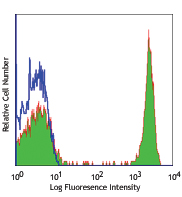
Compare Data Across All Formats
This data display is provided for general comparisons between formats.
Your actual data may vary due to variations in samples, target cells, instruments and their settings, staining conditions, and other factors.
If you need assistance with selecting the best format contact our expert technical support team.
-
Brilliant Violet 650™ anti-human CD4
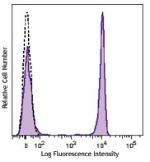
Human peripheral blood lymphocytes were stained with CD4 (cl... -
Purified anti-human CD4
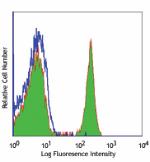
Human peripheral blood lymphocytes stained with purified OKT... 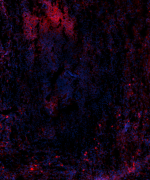
Human frozen spleen tissue slices were fixed with 4% PFA for... -
Biotin anti-human CD4
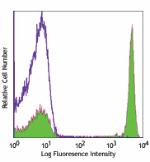
Human peripheral blood lymphocytes stained with biotinylated... -
FITC anti-human CD4
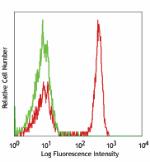
Human peripheral blood lymphocytes stained with OKT4 FITC -
PE anti-human CD4
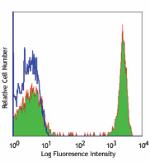
Human peripheral blood lymphocytes stained with OKT4 PE 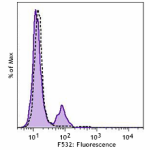
Human peripheral blood was stained with CD4 (clone OKT4) PE ... -
PE/Cyanine5 anti-human CD4
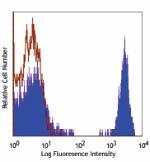
Human peripheral blood lymphocytes stained with OKT4 PE/Cyan... -
PE/Cyanine7 anti-human CD4
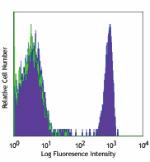
Human peripheral blood lymphocytes stained with OKT4 PE/Cyan... -
APC anti-human CD4
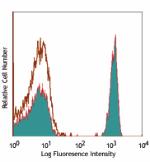
Human peripheral blood lymphocytes stained with OKT4 APC -
APC/Cyanine7 anti-human CD4
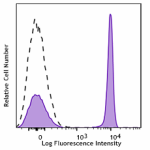
Human peripheral blood lymphocytes stained with CD4 (clone O... -
Alexa Fluor® 488 anti-human CD4
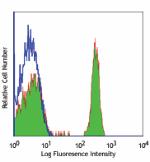
Human peripheral blood lymphocytes stained with OKT4 Alexa F... 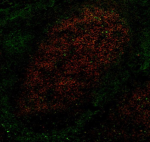
Human frozen tonsil tissue slices were fixed with 4% PFA for... -
Alexa Fluor® 647 anti-human CD4
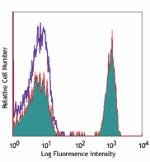
Human peripheral blood lymphocytes stained with OKT4 Alexa F... 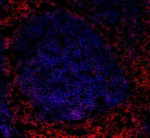
Human frozen tonsil tissue slices were fixed with 4% PFA for... -
Alexa Fluor® 700 anti-human CD4
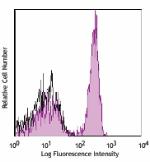
Human peripheral blood lymphocytes stained with OKT4 Alexa F... -
Pacific Blue™ anti-human CD4
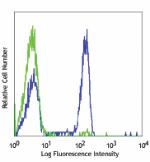
Human peripheral blood lymphocytes stained with OKT4 Pacific... -
PerCP/Cyanine5.5 anti-human CD4
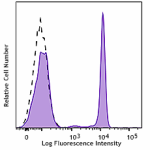
Human peripheral blood lymphocytes were stained with CD4 (cl... -
PerCP anti-human CD4
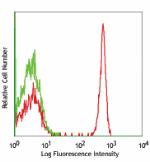
Human peripheral blood lymphocytes stained with OKT4 PerCP -
Brilliant Violet 421™ anti-human CD4
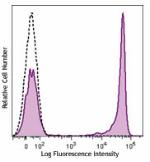
Human peripheral blood lymphocytes were stained with CD4 (cl... 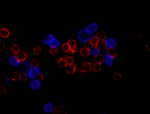
Human peripheral mononuclear cells were fixed with 2% parafo... -
Brilliant Violet 605™ anti-human CD4
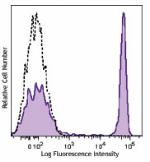
Human peripheral lymphocytes were stained with CD4 (clone OK... -
Brilliant Violet 711™ anti-human CD4
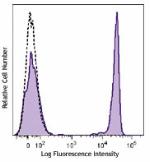
Human peripheral blood lymphocytes were stained with CD4 (cl... -
Brilliant Violet 785™ anti-human CD4
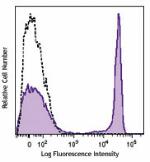
Human peripheral lymphocytes were stained with CD4 (clone OK... -
Brilliant Violet 510™ anti-human CD4
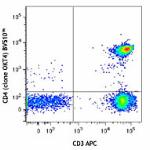
Human peripheral lymphocytes were stained with CD3 APC and C... -
Brilliant Violet 570™ anti-human CD4
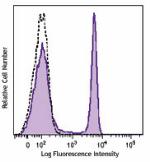
Human peripheral lymphocytes were stained with CD4 (clone OK... -
PE/Dazzle™ 594 anti-human CD4
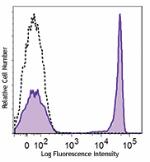
Human peripheral blood lymphocytes were stained with CD4 (cl... -
TotalSeq™-A0922 anti-human CD4
-
Ultra-LEAF™ Purified anti-human CD4
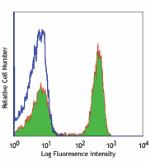
Human peripheral blood lymphocytes stained with Ultra-LEAF™ ... -
TotalSeq™-C0922 anti-human CD4
-
TotalSeq™-B0922 anti-human CD4
-
PE/Fire™ 810 anti-human CD4
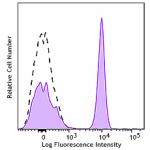
Human peripheral blood lymphocytes were stained with anti-hu... -
APC/Fire™ 750 anti-human CD4 Antibody

Human peripheral blood lymphocytes were stained with anti-hu...
 Login / Register
Login / Register 










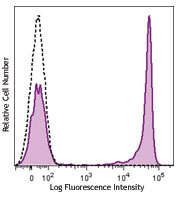
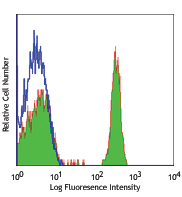
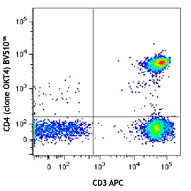



Follow Us